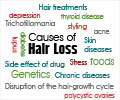- Telogen effluvium (TE) is observed as a manifestation of COVID-19, leading to diffuse hair loss in infected individuals
- The study found that a significant percentage of COVID-19-recovered patients experienced hair loss, with varying timelines of onset
- Recognizing COVID-19 as a potential cause of hair loss can aid in patient education and understanding the transient nature of the condition
Comparing the Effects of Zinc Sulfate, Calcium Pantothenate, Their Combination and Minoxidil Solution Regimens on Controlling Hair Loss in Women: A Randomized Controlled Trial
Go to source). This study aims to shed light on the presence of hair loss as a potential sequela of COVID-19 infection, specifically focusing on the second wave of the pandemic.
Hair Loss and COVID-19
Hair, often considered a cosmetic feature, has gained attention due to its medical significance. The human scalp comprises millions of follicles, and the hair growth cycle consists of three phases: anagen (growth), catagen (transition), and telogen (resting). Telogen effluvium (TE) is a condition characterized by sudden and excessive shedding of normal club hairs, typically occurring 2-3 months after a triggering event. Common causes include febrile illness, postpartum changes, surgery, emotional stress, and systemic illnesses. However, in some cases, no specific trigger can be identified. Since the emergence of the novel coronavirus, medical professionals have observed various dermatological manifestations of COVID-19, including new-onset diffuse hair loss. This hair loss pattern aligns clinically with telogen effluvium and has raised concerns among researchers. With this background in mind, the present study aims to establish a link between hair loss and COVID-19 infection, focusing on the second wave of the pandemic.Assessing Hair Loss in COVID-19 Patients
A cross-sectional study was conducted at a tertiary care center in South India. Using Google Forms, a questionnaire was designed to collect relevant data from COVID-19-positive patients who had recovered from the infection during the second wave. The questionnaire included questions about COVID-19 infection, the presence of hair loss, and factors that aggravated or relieved the condition. A total of 114 participants were included in the study, and their responses were collected and analyzed.
Hair Loss as a Post-COVID-19 Symptom
Among the 114 participants, the majority were female, reflecting a higher prevalence of hair loss concerns in women. Notably, 72% of the patients reported hair loss after recovering from COVID-19. Among those experiencing hair loss, 66.7% noticed a worsening of the condition after 3 weeks of COVID-19 infection, while 21.7% observed it within 2-3 weeks, and the remaining 11.7% noticed it within a week of infection. Additionally, 50.1% of the patients reported associated stress, while 12.3% had comorbidities.COVID-19: A Potential Trigger for Hair Loss
The onset of telogen effluvium after COVID-19 infection further impacts the quality of life for patients, even after recovering from the primary illness. Recognizing COVID-19 as a potential trigger for hair loss is crucial in educating patients about the temporary nature of the condition. By understanding the connection between COVID-19 and hair loss, healthcare professionals can provide appropriate guidance and support to affected individuals.In conclusion, this study highlights the presence of hair loss as a sequela of COVID-19 infection. The findings emphasize the need to address the psychological and physical effects of telogen effluvium in post-COVID-19 patients. By raising awareness and offering appropriate management strategies, healthcare providers can help individuals navigate the challenges associated with hair loss and improve their overall well-being.
Reference:
- Comparing the Effects of Zinc Sulfate, Calcium Pantothenate, Their Combination and Minoxidil Solution Regimens on Controlling Hair Loss in Women: A Randomized Controlled Trial - (https://pubmed.ncbi.nlm.nih.gov/28616431/)
Source-Medindia
















